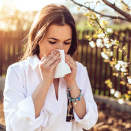Allergy Remedies
View All Section Pages

With flowers in bloom as well as tree and grass pollen dusting, allergy sufferers look to a variety of remedies for symptom relief. Cooper Clinic Platinum Physician Christopher Abel, MD, discusses the most common allergy causes and a variety of ways to combat symptoms.
The medical term for allergies is “allergic rhinitis,” or “allergic rhinosinusitis.” According to Dr. Abel, approximately 10-30% of people, both children and adults, suffer from allergies. “Allergies occur when the body’s immune system reacts to a foreign substance the body identifies as harmful or risky, even though it generally is not,” says Abel. “It usually takes several years and multiple exposures to the specific allergens for the body to develop a consistent allergic reaction.” This is why allergies are typically not seen in children under the age of two.
In addition to developing an immune response when the body is exposed to allergens, inflammatory cells within the body, such as mast and basophil cells, produce histamine and other chemicals that ultimately are to blame for the uncomfortable symptoms associated with allergies. Common allergy symptoms include:
- Nasal congestion and drainage
- Sneezing
- Itching
- Loss of taste
- Facial or sinus pressure around the eyes
- Itchy, burning or watery eyes
- Sore throat
- Rashes
- Coughing
- Daytime drowsiness
- Fatigue
Outdoor versus indoor allergens
Seasonal allergy symptoms are usually related to outdoor allergens such as pollen, trees, grasses and weeds. “There are many types of outdoor allergens and they vary by location and time of year. For example, pollens from elm, maple, oak and juniper trees cause many springtime allergies while grass pollens typically contribute to allergies during the summer,” says Abel. He explains many suffer from allergies in the fall due to high ragweed levels; however, outdoor allergens are typically less problematic in the winter months.
The most common contributors to indoor allergies include dust mites, pet dander, rodents and mold.
Remedies for allergy symptoms
Thankfully, practical solutions are available for allergy symptom relief. With years of experience in primary and acute care, Dr. Abel recommends the following treatment options for his patients.
Environmental solutions:
- Avoid allergy triggers when possible
- Shower at night, thereby removing allergens before bedtime
- Limit animal allergen triggers within the house, especially on the bed
- Vacuum and dust the home often to remove pet hair, dander and dust
- Frequently change furnace and air conditioning system filters
- Avoid opening windows during high outdoor allergen times
- Wear a mask during high pollen count days
- Prohibit smoking indoors
- Use a humidifier in the bedroom or living room
Over-the-counter medication options:
- Take an oral or nasal antihistamine medication, which are typically either sedating or non-sedating (or non-drowsy)
- At nighttime, choose a sedating antihistamine, such as Benadryl®
- During the day, choose a non-drowsy antihistamine, such as Claritin®, Zyrtec®, Allegra® or Xyzal®
- Try a nasal steroid, which now allows one to avoid systemic steroids or oral steroid medications
- Occasional use of an oral or nasal decongestant medication during times of severe congestion
- Use a saline spray or sinus rinse to help alleviate nasal congestion and remove allergens
Physician prescribed:
- Allergen immunotherapy is a viable option for severe allergy sufferers, which is typically administered through allergy shots or oral immunotherapy
- Leukotriene modifiers, such as Singulair®, can prove to be helpful for patients with allergies and asthma
- Leukotriene modifiers are usually prescribed to patients whose symptoms are not well controlled by nasal therapies
All-natural remedies:
- Cinnamon bark can be easily consumed in supplement form or steeped in your favorite hot tea
- Peppermint and green tea embody many anti-inflammatory and antibacterial properties to aid in nasal congestion
- Ginger serves as a natural antihistamine and immune booster
- Steep ginger in hot water to drink as a tea to alleviate nasal congestion and headaches
- Eucalyptus oil can be added to an at-home humidifier to provide decongestant relief while sleeping
- Honey has been proven to soothe sore throats and can be either added to hot tea or consumed orally with a spoon
A number of other herbal and alternative therapies have been used over the years for managing allergy symptoms, but the research demonstrating benefit is inadequate. Alternative therapies include acupuncture and acupressure therapies, which have shown mixed results in clinical trials.
When to see an allergist
Many patients with allergy symptoms can manage them with the help of their primary care physician, utilizing the treatments outlined above. If the patient's symptoms are not well controlled on the treatments recommended by their physician, Dr. Abel recommends visiting with an allergist. “An allergist will perform skin tests to identify allergens by evaluating the body’s IgE-mediated response, or how the skin reacts when presented with specific allergens,” says Abel. Another option is conducting serum testing by drawing blood. The benefit to this route is that it poses no potential risk to the patient in regard to having a severe allergic reaction. However, blood tests are considered to be less accurate than skin testing.
Keep in mind there are other conditions can present allergy-like symptoms including side effects from certain blood pressure or psychiatric medications, hypothyroidism and even pregnancy.
Whether you suffer from seasonal or year-round allergy symptoms, relief from the myriad of symptoms caused by indoor and outdoor allergies alike is attainable. Talk to your doctor about which type of treatment may be best for you as they understand your health profile best.
Learn more about Cooper Clinic preventive exams and Cooper Clinic Platinum 24/7 preventive and primary care.